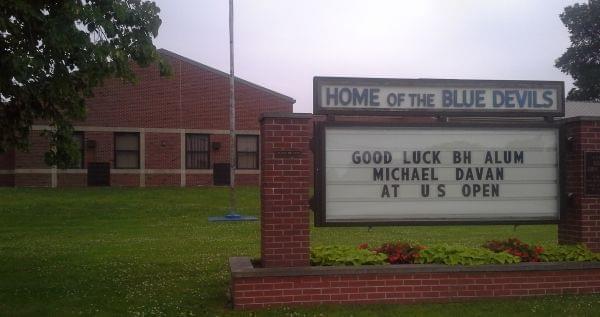Decision Time Nears For Bismarck-Henning & Rossville-Alvin Co-Op High School Proposal

View of Bismarck-Henning High School in Bismarck. The school would become a co-op high school for the Bismarck-Henning and Rossville-Alvin school districts, if voters approve. Jim Meadows / Illinois Public Media
By Wednesday morning — the day after Election Day — residents in two Vermilion County school districts should know if they will be sharing a cooperative high school.
If voters in the Rossville-Alvin and Bismarck-Henning districts say yes to the referendum on the April 4th ballot, Rossville-Alvin will share in the use, expense and governance of Bismarck-Henning’s high school.
The boards of the two school districts have both held public meetings to explain the proposals.
Under the co-op arrangement, the two school boards would each send three of their members to serve on a special cooperative board for Bismarck-Henning high school. The Bismarck-Henning board would send a fourth member to serve as the co-op board’s president; that member would vote only in case of a tie.
Rossville-Alvin closed its own high school several years ago. It currently pays both Bismarck-Henning and Hoopeston high schools to accept students from their district. But the district has no voice in running either of high school.
Rossville-Alvin Superintendent Crystal Johnson says a co-op arrangement with Bismarck Henning would provide several advantages, including “an opportunity to unite our community, and have our community behind one high school; representation for our high school students in maintaining that connection — as well as a very strong curriculum.”
If the two districts agree to a cooperative high school, Rossville-Alvin will gradually stop sending students to the high school in Hoopeston. Students from the district currently attending Hoopeston Area High School would continue to do so, and siblings whose high school years overlap with them could join them at Hoopeston as well.
But Johnson says the Rossville-Alvin school board has already voted not to renew its tri-party agreement with the two high schools, in anticipation of the cooperative high school referendum being approved.
Johnson says an alternative to a cooperative high school might be the consolidation of the two school districts. But in a consolidated district, residents of small communities often worry that their local school could be closed by a future school board.
Johnson says that by sharing a cooperative high school, the Rossville-Alvin school district will keep local control of its K-8 school in Rossville.
“I think our board’s main focus was preserving a grade school in the Rossville community,” said Johnson, “and the way to ensure that is to be sure that we’re controlling costs for our high school students.”
Johnson says the co-op agreement with Bismarck-Henning could keep their high school costs roughly the same at first --- and then lower them dramatically once bonds on the high school are paid off in 2021. For now, Johnson says neither school board has plans to change its property tax rate.
The referendum must win majorities in both the Rossville-Alvin and Bismarck Henning districts to pass. In the case of Rossville-Alvin, Supt. Johnson says she thinks a majority of residents favor a cooperative high school, but the final result will depend on the level of voter turnout.
If the referendum passes in both districts, Bismarck-Henning High School will become Illinois’ second cooperative high school. The first is Paris Cooperative High School in Edgar County, which is shared by the Paris Union and Paris Crestwood school districts.

